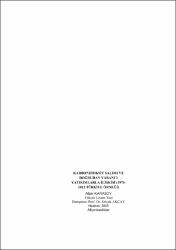Karbondioksit salımı ve doğrudan yabancı yatırımlarla ilişkisi (1974-2012 Türkiye örneği)
Özet
Bu çalışmada doğrudan yabancı yatırımlar ve karbondioksit salımı arasındaki ilişki Türkiye için, 1974-2012 dönemine ait yıllık veriler kullanılarak, kirlilik sığınağı ve kirlilik halesi hipotezleri çerçevesinde incelenmiştir.
Uygulama kısmında, başlangıçta, eş-bütünleşmenin, vektör hata düzeltme modeli (VECM) ve VECM temelli Granger nedenselliğin kullanıldığı bu çalışmada, uzun ve kısa dönem nedensellikler yönleriyle beraber tespit edilmiştir. Devamında, varyans ayrıştırması ve etki-tepki analizleriyle tespit edilmiş olan nedenselliklerin gücü ve işaretleri belirlenmiştir.
Sonuçta, bu çalışmada kullanılmış diğer iktisadi değişkenler arasında saptanmış olan nedenselliklerle birlikte, doğrudan yabancı yatırımlardan karbondioksit salımına doğru tek yönlü, uzun dönem bir nedensellik bulunmuştur. Bu nedensellik incelendiğinde doğrudan yabancı yatırımların emisyon üzerindeki etkisinin, pek kuvvetli olmamasına rağmen, negatif olduğu tespit edilmiştir. Bu sonuç Türkiye’de kirlilik sığınağı hipotezinin geçerli olmadığı fakat kirlilik halesi hipotezinin, çok güçlü bir şekilde olmasa da, geçerli olduğu şeklinde yorumlanmıştır. Ek olarak, diğer iktisadi değişkenler arasındaki anlamlı nedensellikler de incelenerek, çeşitli politika önerileri sunulmuştur. In this study, the relationship between carbon dioxide emission and foreign direct investment is investigated in Turkey using annual data covering 1974-2012 period in the context of the pollution haven and halo hypotheses.
For the application part, in the beginning, co-integration, vector error correction model (VECM) and VECM based Granger causality analysis are used and both long and short run causalities are detected with their directions. Then, by employing variance decomposition and impulse-response analysis the strength and the signs of the obtained causalities are examined.
As a result, along with the causalities which are detected among the other economic variables that are used in this study, a unidirectional, long-run causality from foreign direct investment to emission is found. When this long-run causality is investigated, it is observed that although this causality is not strong, it shows that foreign direct investment has a negative impact on emission. This result indicates that the pollution haven hypothesis is not valid, but the pollution halo hypothesis is weakly supported in Turkey. Additionally, by examining significant causalities among other economic variables, some policy recommendations are proposed.
Bağlantı
http://hdl.handle.net/11630/4951Koleksiyonlar
- Yüksek Lisans Tezleri [1691]



















